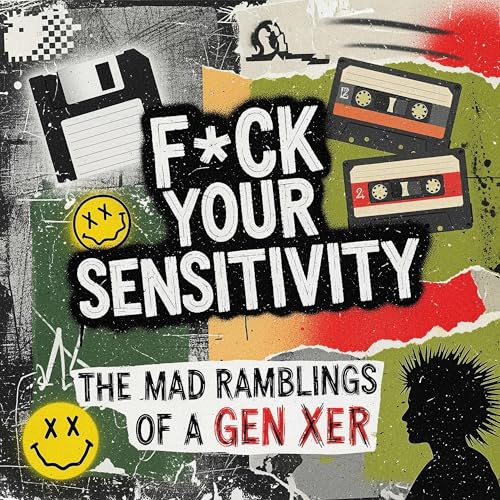
F*ck Your Sensitivity - The Mad Ramblings of a Gen X-er
Failed to add items
Add to basket failed.
Add to Wish List failed.
Remove from Wish List failed.
Follow podcast failed
Unfollow podcast failed
-
Narrated by:
About this listen
"This is the true story of a Gen X-er picked to do a podcast and give his personal views on Pop Culture, Politics, Sports, News and more, So find out what happens when people stop being polite and start getting real. - ‘Get Of My Lawn’ As we grow into an ever changing world and new Generations are born, only one stays the same with their distain for all others - ‘Gen X’. We survived riding bikes without helmets, No cell phones, understanding you go home when the street lights go on. We lived through Hair Metal and watched the birth of Grunge. We witnessed ‘Two’ Bush’s become President (That’s what she said.) and the First African American take office. We watched in horror as the Towers fell and rejoiced at the Socialize Digital Age. (‘The Internet’ - Sorry Al you didn’t invent it.)But all in all, We lived our lives with the understanding that playing it safe is not the way to go through your existence. As the world is facing more turmoil than we have every seen before and as we witness a clear division of our Society a voice of ‘reason’ and ‘sanity’ needs to be heard. To bad that ain’t me … Hear me ramble daily about everything from Pop Culture, Politics, Sports, News and more and get the clear as ‘Mud’ perspective of this Rambling Gen X-er. Enjoy!
© 2025 F*ck Your Sensitivity - The Mad Ramblings of a Gen X-er-
 Dec 5 202523 mins
Dec 5 202523 minsFailed to add items
Sorry, we are unable to add the item because your shopping cart is already at capacity.Add to basket failed.
Please try again laterAdd to Wish List failed.
Please try again laterRemove from Wish List failed.
Please try again laterFollow podcast failed
Unfollow podcast failed
-
 19 mins
19 minsFailed to add items
Sorry, we are unable to add the item because your shopping cart is already at capacity.Add to basket failed.
Please try again laterAdd to Wish List failed.
Please try again laterRemove from Wish List failed.
Please try again laterFollow podcast failed
Unfollow podcast failed
-
 Nov 14 202520 mins
Nov 14 202520 minsFailed to add items
Sorry, we are unable to add the item because your shopping cart is already at capacity.Add to basket failed.
Please try again laterAdd to Wish List failed.
Please try again laterRemove from Wish List failed.
Please try again laterFollow podcast failed
Unfollow podcast failed


